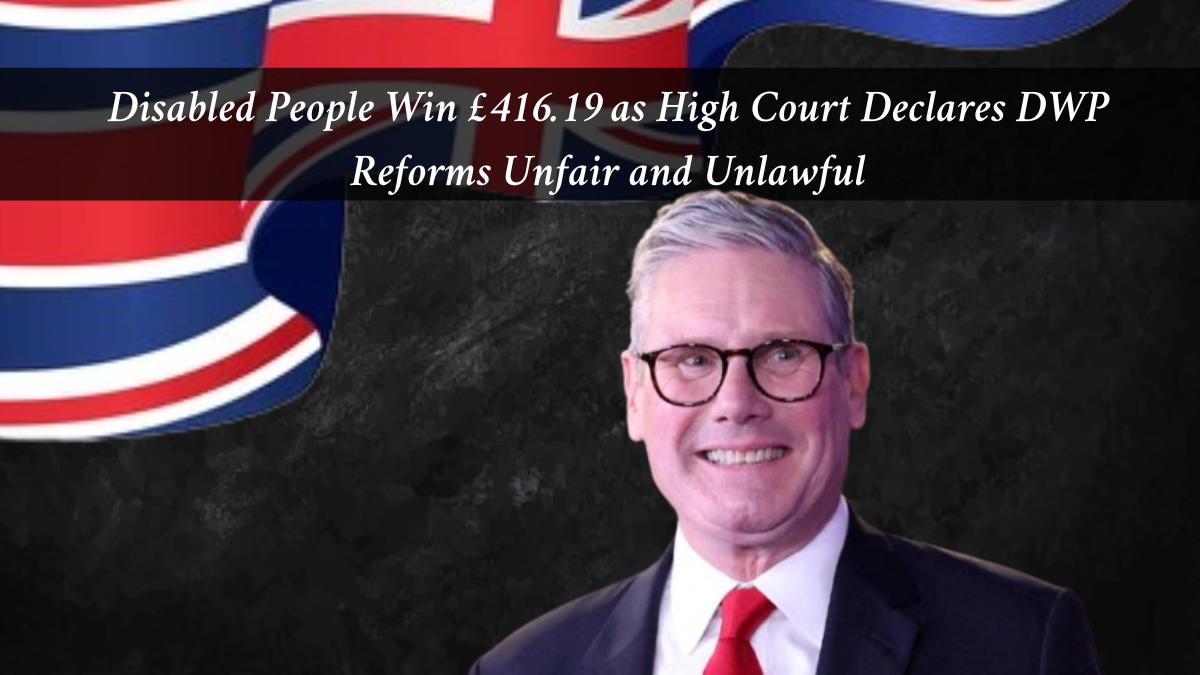In a significant legal decision, the High Court has ruled that the Department for Work and Pensions (DWP) acted unlawfully in its attempt to implement reforms to the Work Capability Assessment (WCA). These proposed changes could have resulted in approximately 424,000 disabled individuals losing up to £416.19 per month in benefits. Public Law Project

Summary Table
| Aspect | Details |
|---|---|
| Proposed Reforms | Changes to WCA criteria aimed at cost savings |
| Potential Impact | Up to 424,000 individuals losing £416.19/month |
| Legal Challenge | Initiated by activist Ellen Clifford |
| High Court Findings | Consultation was misleading and unlawfully short |
| Government Response | Plans to re-consult with emphasis on transparency |
| Advocacy Groups’ Stance | Emphasize inclusion of disabled individuals in policy-making |
| Official Resources | Public Law Project |
Background of the Proposed Reforms
In September 2023, the DWP initiated an eight-week consultation to propose changes to the WCA, the mechanism used to evaluate eligibility for health-related benefits. The department presented these reforms as measures to support disabled individuals in returning to work. However, internal documents later revealed that the primary motivation was to achieve significant cost savings for the government. RedditDisability Rights UK
Details of the Proposed Changes
The proposed reforms aimed to alter the criteria within the WCA, making it more challenging for individuals to qualify for certain benefits. Specifically, the changes targeted descriptors related to mobility and mental health, potentially disqualifying many from receiving necessary support. The Office for Budget Responsibility estimated that these reforms would lead to 450,000 new claimants being over £400 a month worse off, with only 15,400 individuals expected to find employment by 2029. This indicates that nearly 97% of those affected would experience financial losses without gaining employment. Reddit
Legal Challenge and High Court Findings
Disability rights activist Ellen Clifford, represented by the Public Law Project, challenged the legality of the DWP’s consultation process. The High Court found that the consultation was misleading and failed to adequately inform participants of the substantial financial losses they could incur. The court highlighted that the consultation did not make it clear that the proposals would replace voluntary work-related activity with compulsory measures and reduce the income of a large number of claimants. Furthermore, the consultation period was deemed unlawfully short, given the significant impact of the proposed changes. Reddit+4Disability Rights UK+4Disability Rights UK+4The IndependentThe Independent+2Reddit+2Yahoo News+2The Guardian
Implications for Disabled Individuals
The court’s ruling underscores the importance of transparency and fairness in policy-making, especially when reforms have the potential to adversely affect vulnerable populations. Had the proposed changes been implemented, many disabled individuals would have faced significant financial hardship, potentially pushing over 100,000 into poverty. The Guardian
Government Response and Future Actions
In response to the ruling, the government has acknowledged the need for a more transparent and inclusive consultation process. Labour’s Work and Pensions Secretary, Liz Kendall, announced plans to re-consult on the descriptor changes, emphasizing the importance of engaging with disabled individuals and advocacy groups to ensure that future reforms are both fair and effective. Reddit+1The Independent+1
Advocacy and Support
Disability advocacy groups have welcomed the High Court’s decision, viewing it as a validation of their concerns regarding the proposed reforms. They continue to emphasize the necessity of involving disabled individuals in policy discussions that directly impact their lives and well-being.
Frequently Asked Questions (FAQs)
What is the Work Capability Assessment (WCA)?
The WCA is a test used by the DWP to determine eligibility for health-related benefits, assessing an individual’s capability to work based on their physical and mental health conditions.
Why were the proposed reforms considered unlawful?
The High Court found that the DWP’s consultation on the reforms was misleading, failed to disclose the primary motive of cost savings, and did not adequately inform participants of the potential financial losses, rendering the process unfair and unlawful.
How many people would have been affected by the proposed changes?
Approximately 424,000 disabled individuals were at risk of losing up to £416.19 per month if the proposed reforms had been implemented.
What steps is the government taking following the ruling?
The government has announced plans to re-consult on the proposed changes, aiming to ensure a transparent and inclusive process that adequately considers the perspectives of disabled individuals and advocacy groups.
Where can I find more information on this ruling?
Detailed information is available through the Public Law Project’s official website: Public Law Project.
Conclusion
The High Court’s ruling serves as a critical reminder of the need for transparency, fairness, and inclusivity in the formulation of policies that affect vulnerable populations. As the government moves forward with plans to revisit disability benefit assessments, it is imperative that the voices of disabled individuals are central to the conversation to ensure that any reforms genuinely support their needs and rights.
For More Information Click Here